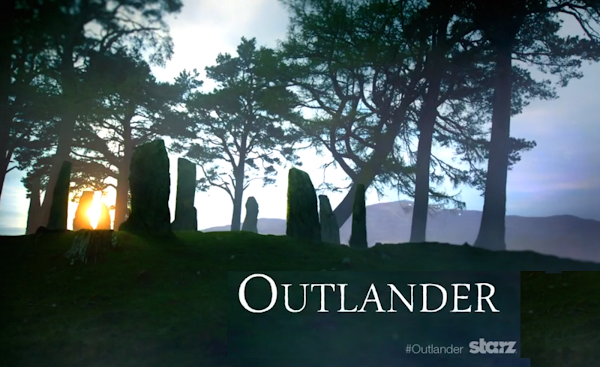Book Review: BLACKOUT by Connie Willis
Like many OUTLANDER fans, I'm a lifelong reader of time-travel stories. I loved Connie Willis's novel, DOOMSDAY BOOK, about a time-traveler who goes back to the year 1348 and the Black Death, and so I was really looking forward to the newest Connie Willis time-travel book, titled BLACKOUT. The premise is similar to DOOMSDAY BOOK: time-traveling historians from the mid-21st century going back to observe past events -- in this case, in WWII England during the time of the Blitz. It's a time period that I really don't know much about, and so I was intrigued, and looking forward to this story very much.
However....BLACKOUT left me feeling underwhelmed. It is deliberately being marketed as the first half of a two-part story, and I'm not sure I'm going to bother with the second part when it comes out later this year.
Warning: Major spoilers below! Don't read below if you don't want to know yet.
S
P
O
I
L
E
R
S
The opening pages set the tone for the whole book. Characters rushing around from one place to another, pages and pages of very tedious explanations of how person A just missed encountering person B, and maybe B's gone off to X, so person A goes chasing after them, only to discover they're actually at Y instead, but "Better hurry because the [wherever they're going] is about to close!" ....which sends A racing off again, in a fruitless and futile search for whoever it is he's trying to find. This sort of situation occurs over and over and over again throughout this book. It got very tiresome after a while.
The sections set in the year 2060 suffer from the same curiously low-tech communications system that was evident in DOOMSDAY BOOK. No cell phones, no answering machines, no Internet, no email. And this is supposed to be 50 years in our future? I didn't find it believable.
I liked many of the parts set in WWII-era England. The descriptions of what life was like during the Blitz, what the shelters were like, how people were warned that even lighting a match for a cigarette at night could be enough to draw an enemy bomber....I found all of that very interesting. Ditto the children being evacuated (I didn't know they had housed evacuee children in manor houses, for example). And the Dunkirk storyline was quite interesting, too.
(Fascinating to think about these events from the perspective of an OUTLANDER fan, by the way. It's very easy, after reading this book, to picture Roger and his mum and grandmother hurrying to the nearby shelter in a tube station, or living in a small flat somewhere in England with blackout shades drawn tight over the windows every evening. Or Roger himself, as a frightened five-year-old orphan, sent off to live with his great-uncle after his mother was killed in the Blitz.)
Most of the things I didn't like about this book concerned the time-travelers themselves. I thought they seemed to be far too dependent on their historical research, instead of using common sense. At one point, a character realizes that she needs to learn to drive. So instead of potentially embarrassing herself by not knowing how to open a 1940's car door (!), she goes back to the time portal (the "drop") and returns to the future to get instruction on how to drive a car. What's wrong with simply watching carefully and copying what other people from that time period are doing?? (Can you imagine Claire or Roger popping back through the stones to look up information from the historical record every time they encounter an unfamiliar situation? Neither can I.)
Several of these time-travelers seemed to lack common sense, being much more concerned with trivialities than with observing the people around them (which was, I thought, the point of the time-traveling in the first place). They seem unable to think quickly or cope with the unexpected...hardly desirable qualities in potential time-travelers! (Kivrin, the time-traveler from THE DOOMSDAY BOOK, seems by contrast both far more intelligent and far better prepared to cope with changing circumstances than any of the time-travelers in this book.)
As one of the reviewers on Amazon put it, "I would not drop this lot off in a mall parking lot far from home and expect them to live." And while that's a bit harsh <g>, I think it's not much of an exaggeration.
In the last part of the book, the incessant refrain, "But this was time travel!" became really annoying after a while. The idea was that their rescuers had (literally) "all the time in the world" to find a way to get to the time-travelers stuck in 1940, so why hadn't they come? I couldn't help asking a different question: If the time-travelers had all the time in the world to plan and prepare for their various journeys into the past, why were they in such an ungodly hurry in the beginning of the book, rushed into assignments without sufficient preparation, etc? It didn't make any sense to me, except as a way to set up the plot.
All in all, I have to say I was disappointed with this book. I really wanted to like it, but in the end, the negatives outweighed the positives. The book ended with a cliffhanger, but not one that's powerful or interesting enough to make me eager to read part 2 of the story.
The sequel, ALL CLEAR, is due out in November 2010.







Debbie - The author did a great job with the historical research. That was the best part of the book, in my opinion. And I also liked the quotes at the beginning of each chapter.
Karen